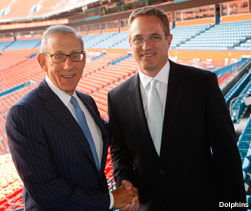Over 250 Mayors Gather in the Capital, Stress Merits of Obama’s Economic Recovery Plan
WASHINGTON, D.C. – In the midst of a historic Presidential Inauguration, more than 250 of the nation’s mayors, led by U.S. Conference of Mayors President Miami, FL, Mayor Manny Diaz, have gathered at the Capitol Hilton in Washington, D.C. for the 77th Winter Meeting of The U.S. Conference of Mayors to discuss national priorities and the proposed Obama Economic Recovery Plan.
During their opening press conference, the mayors urged Congress to move quickly on President-Elect Barack Obama’s call for a national Economic Recovery Plan to immediately create jobs and make investments in the future economy.
President Diaz is pleased with the President-Elect’s proposal saying, “This plan is the first crucial step in a concerted effort to create and save millions of jobs, jumpstart our economy, and begin the process of transforming our America for the 21st Century. Mayors are pleased to see significant funding for local programs with targeted investments and unprecedented accountability measures.”
Many of the programs that have been proposed in the House legislation represent long-term priorities that the Conference of Mayors has been promoting for years, including items called for in the Mayors’ 10-Point Plan: Strong Cities, Strong Families, for a Strong America. In addition, the House measure reflects funding in every one of the 10 program areas the mayors recently called for in their MainStreet Economic Recovery (www.usmayors.org).
In an effort to show how quickly cities could produce new jobs, the mayors have compiled over the last two months a series of MainStreet Economic Recovery Reports that inventories local ready-to-go infrastructure projects that could be completed in two calendar years. In the latest of MainStreet Economic Recovery Reports released today, 779 cities across the country report a total of 18,750 local infrastructure projects that could produce over 1 million jobs with a federal investment of $100 billion.
The American people are aligned with the mayors’ priorities. A Zogby poll conducted for the Conference and released today, found that 84% of respondents believe that infrastructure improvements are important to the health of the local economy. In another significant finding, respondents trust local government over state government by a margin of three to one. Finally, while only 37 percent of respondents believe the President-Elect’s economic recovery plan will help “people like me,” a majority of respondents believe the plan will help create local jobs (55%) and help stimulate the local economy (54%).
“The economy is getting worse, more job losses are on the horizon, and small businesses are folding or holding on by the skin of their teeth,” said U.S. Conference of Mayors President Miami Mayor Manuel A. Diaz. “We need Congress to act now on a recovery plan to put people back to work.”
A new U.S. Conference of Mayors report — U.S. Metro Economies: Metro Unemployment Forecast — emphasizes the urgent need for Congressional action on the Obama Economic Recovery Plan and reinforces the opinions of respondents in the Zogby poll. The report projects a significantly deteriorating job market in the nation’s 363 metropolitan areas this year. According to the report, all but five metropolitan areas will lose jobs in 2009.
The report by Global Insight also projects that by the end of 2009, one-third of all metro areas will have experienced no overall job growth for the decade. For these metros, this decade will be known as the “jobless decade.”
“Our cities and their metro areas are the drivers of our national economy,” said Dallas Mayor Thomas Leppert, Chair of the Conference’s Metro Economic Committee. “This report underscores that any national economic recovery depends on how soon our metro economies can begin producing jobs. Without the economic recovery of metropolitan economies, there can be no U.S. recovery.”
Mayor Diaz concluded, “Cities and metropolitan areas are where 84% of the American people live and where the pain of this economic downturn is being felt most. Because of this, cities are where the greatest resources should be placed and are where public investment can have the greatest bang for the buck.”



